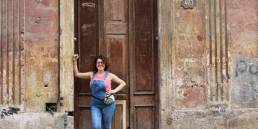Yo soy nacido y criado en El Cerro.
My neighborhood is not where tourists go when they visit La Habana (nor do I want them there, knock on wood!). Our local history is full of magic, and our infrastructure is in bad shape. I wouldn’t change El Cerro for the world. When Cubans in the U.S. ask me where I’m from, sometimes they open their eyes really big and then decide to make a joke about how it must have been tough to grow up in El Cerro. I never find that kind of joke funny, so I don’t laugh. How dare you look down upon me if, with a huge smile on my face and an unimaginable sense of pride, I tell you where I’m from?
El Cerro’s population is majority working class and majority Black. I don’t need data to back this up, I just know. I grew up surrounded by Blackness. All shades of Black. Our hair, our skin, our spirituality, our bodies and our experiences were valued and celebrated. Many of the families in my community have lived in the same neighborhood for generations. El Cerro is all we know. El Cerro is home. Home is meant to be protected.
I remember being in elementary school in the 1990’s, during the Periodo Especial, and reading my first history textbook with so much excitement. I was so eager to learn! I was this little nerd hoping my History teacher would know the story of how my grandparents met, and tell it in front of my class. Everybody in the neighborhood knew that story, maybe it had made it to our history books. I was also very excited to learn more about my roots and where my family came from. I just knew we were from El Cerro, not much more than that.
My History teacher was a good storyteller. The very first lesson was about how, before the colonizers arrived, only Indigenous people lived on the island. Tainos, Guanahatabeyes, Siboneyes. It was so cool to learn how things were so different back then! There were no schools, I don’t think… maybe there were schools? How did kids learn where their families came from? Probably oral history. But if in the 1400’s there were only Indigenous people in Cuba, how did Black people end up on this island in the middle of the sea?
Sigh. The Transaltantic Slave Trade!
Ok then, maestra, after my ancestors were brought to these lands, how did they rebel against the horrors of slavery and fight for their freedom?
I couldn’t help but feel conflicted. I loved history but we weren’t learning much Black history in class. Our history seemed to have been written by someone who forgot our names. Our freedom was “given” to us because our enslavement wasn’t financially viable anymore. Yes, I did learn about the Grajales-Maceo family, and Crombet and Banderas!! But they didn’t seem to have a journey of their own. They had been stripped of their humanity, all we knew was how legendary they were. And I wanted to know everything about their lives! How were they as teenagers? Did they like school? Did they learn Black history in school? Did they also have leche con café for breakfast as kids?
There was too much discrepancy between the history I was (not) being taught in school and how Blackness was celebrated in my community. But El Cerro was home, and it protected me. I found role models in my vecinos who would make sure we would get to school safe because we the kids, were the future. My grandma made me feel grounded with patakies, proverbs. Patakies that my Lucumi ancestors passed down generations and helped keep their traditions and cosmovision alive. My family made sure I would love my culture, regardless of who my History book said I was.
My History teacher couldn’t help me understand my roots. Or the complexity of (my) Blackness. Or why when I read history books it sounds like it has been written to glorify some and diminish many. Because Blackness is so misrepresented in Cuba and the diaspora, I do what I can to re-write my story and dream of magical Black future realities. I’m sure my ancestors would have done the same.
Marley Pulido
Marley Pulido is an Afro-Cuban activist from El Cerro, Havana. He curates Historia Negra de Cuba, a digital archive to decolonize Black Cuban history. He's also a co-founder of La Luchita Project and Cubanos Pa'Lante.
Related Posts
December 14, 2018
Important things for first time visitors to Cuba, by Cubans
Why Not Cuba is a blog by an…

